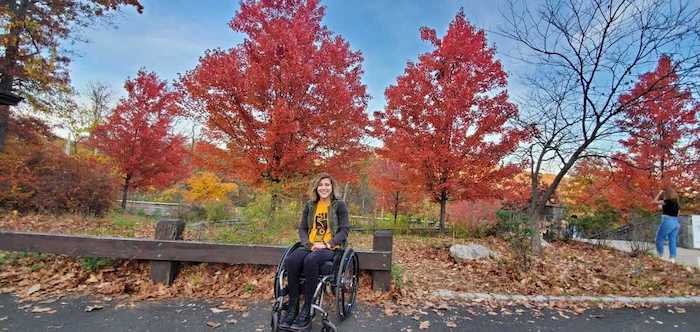International Day of Persons with Disabilities
By GG deFiebre
When I was first diagnosed with transverse myelitis and in the hospital, I had zero desire to interact with anyone else with a disability. I had been taught by society that disability was bad, that it was undesirable. I would not have willingly identified myself as disabled in the beginning. I rejected it. I worked so hard in rehabilitation therapy to get back to “normal.” As I began to adjust to my new life as a wheelchair user, as someone with a permanent disability, I really had to fight hard against the internalized ableism I felt. I had to learn to see myself as worthy – a powerful act in a world that sees disability as a flaw, something broken to be fixed. I had to teach myself that my worth as a human being was not determined by whether I was walking or rolling, whether my hands worked or not. I am still teaching myself that, even 11 years later.
Today, December 3rd, 2020, is International Day of Persons with Disabilities. According to the United Nations website, “The annual observance of the International Day of Disabled Persons was proclaimed in 1992 by United Nations General Assembly resolution 47/3. It aims to promote the rights and well-being of persons with disabilities in all spheres of society and development, and to increase awareness of the situation of persons with disabilities in every aspect of political, social, economic and cultural life.”
According to the World Health Organization, one billion people, or 15% of the world’s population, are living with a disability. The disability community is a group any of us can join at any time, just like I did 11 years ago, and chances are, if you live long enough, you will eventually have some type of disability.
Disabled people still face enormous barriers accessing the world. People with disabilities are less likely to access education, health care, and employment than those without disabilities. The COVID-19 pandemic has certainly not helped the situation either. Disabled people also took note when things we have been asking for and were denied access to, like remote work and learning, were quickly adopted when it impacted able-bodied people. People with invisible disabilities often face discrimination when their disability is misunderstood or not believed by employers, friends, family, and strangers.
For those who do not identify as disabled, be sure to read about the history of disability activism, listen to and elevate the voices of those with disabilities, including those with invisible disabilities, and think actively about how your life and access to things might be different if you had a disability. Challenge your perceptions of disabled people.
If the world wasn’t so hostile to people with disabilities, maybe I wouldn’t have been so quick to dismiss identifying as disabled when I was first diagnosed. It has taken a long time, but I am proud to be disabled.
Happy International Day of Persons with Disabilities!





